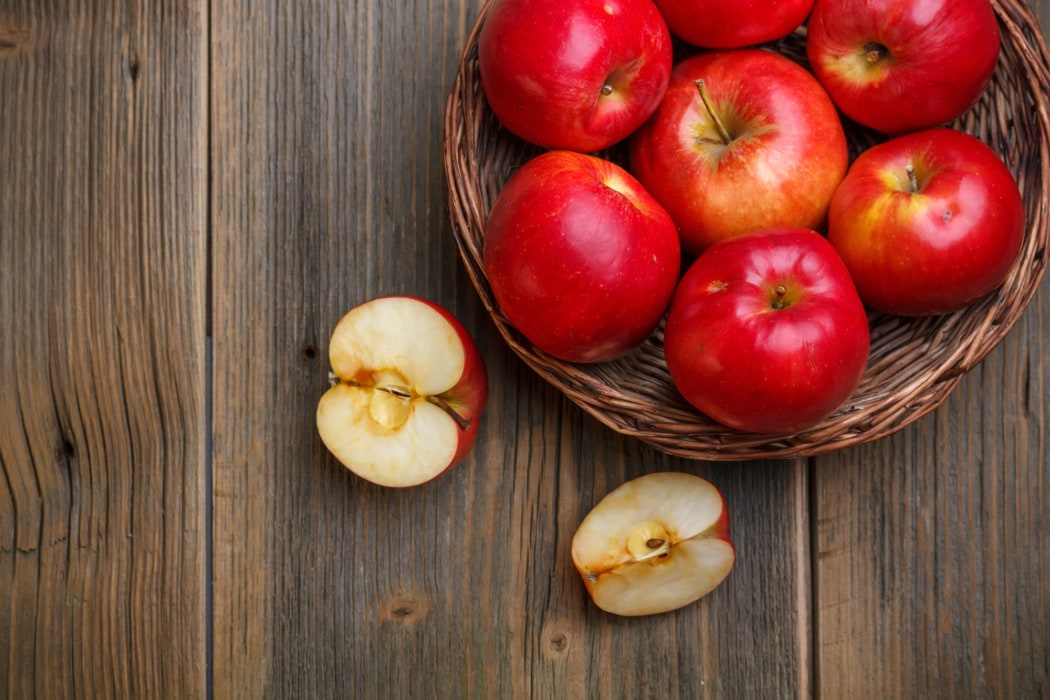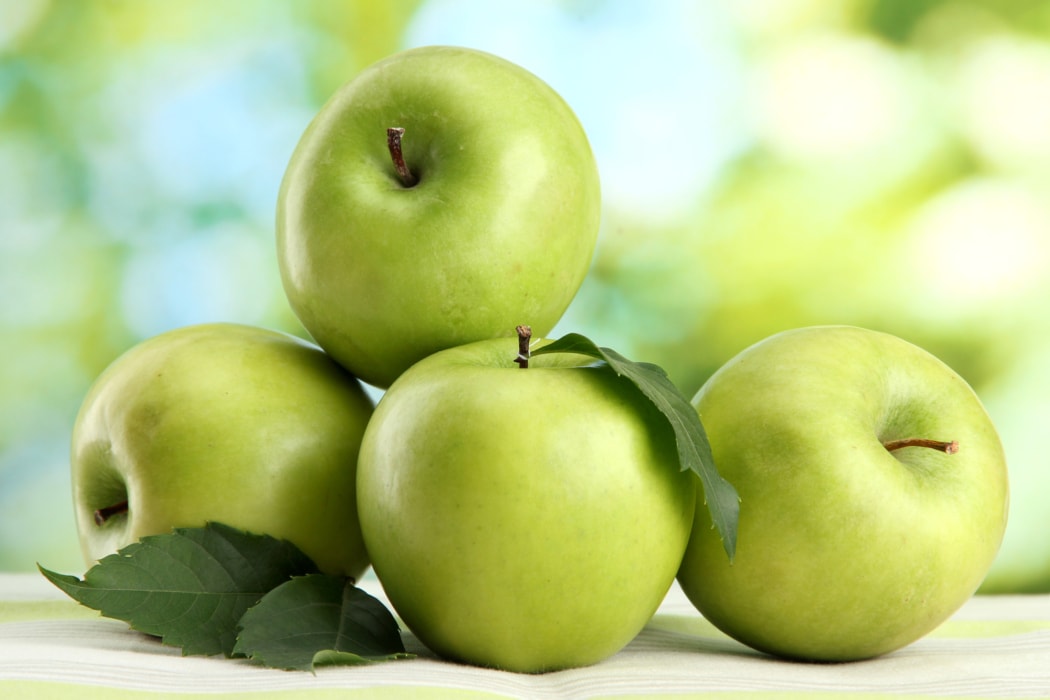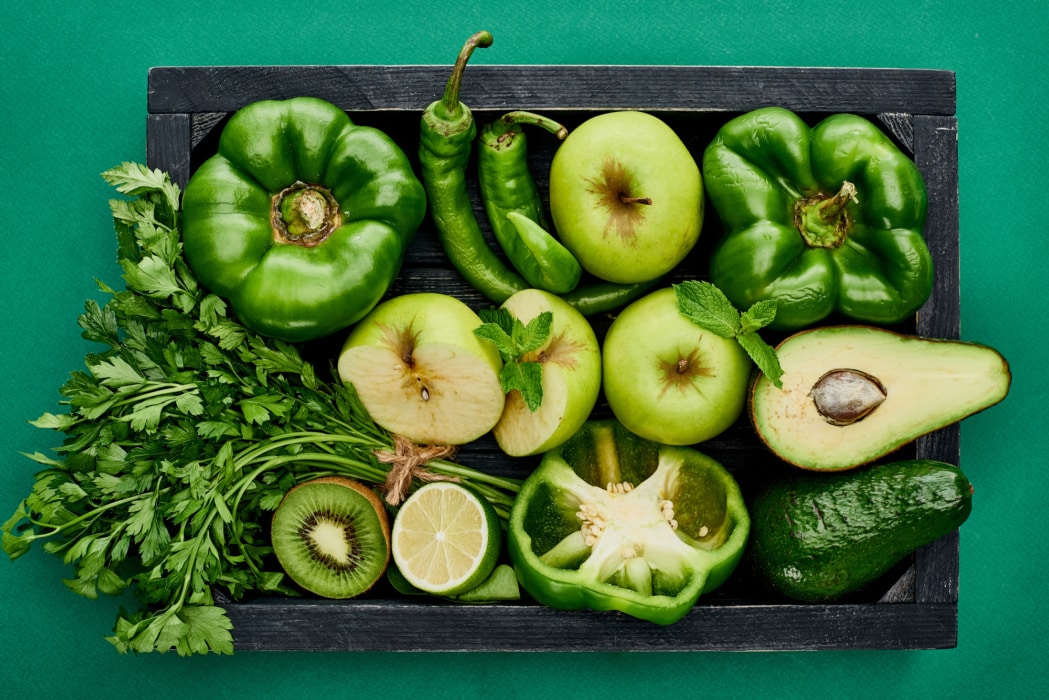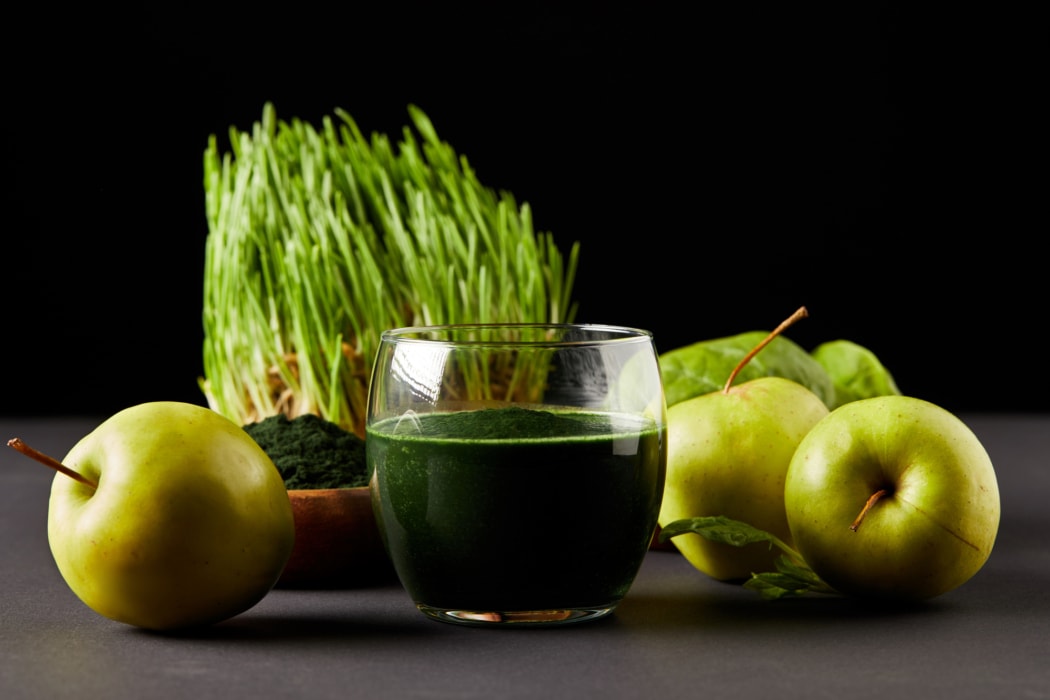The keto diet allows green vegetables to be consumed as healthy sources of fiber. You can also eat some keto fruits and berries as a dessert if your sugar cravings on keto are pretty strong. You can mix berries with keto yogurt for the right proportion of fat, protein, and carbs. Such a snack will saturate you for a long time and will benefit your health. And what about apples? Are they the right option for a keto dessert? Can you eat apples on a ketogenic diet? Is an apple a keto-friendly fruit?
No, you can’t eat apples on a keto diet because they are high in carbs, which can break your ketosis. So the only option available to you is green apples. You can eat them in small amounts during a low carb diet. It allows up to 50 grams of net carbs or during weight maintenance after a keto diet.

How many carbs are in apples? What are the benefits of apples for your health? Can you have apple cider vinegar on keto? How do you eat apples on a low-carb diet that doesn’t require ketosis? Find out all the answers in our article. Let’s figure it all out together!
Are Apples Keto?
There are many types of apples, and they all have different tastes. You can find fruits from sweet reds and fragrant yellows to sour green apples that will surprise you with their bright taste. How many carbohydrates do apples contain? Are they good for the keto lifestyle? Can you eat them while on a keto diet?
Depending on the type, 100 grams of apples contains:
- 41-59 calories
- 3 grams of protein
- 2 grams of fat
- 12-16 grams of carbohydrates
- 2-3 grams of fiber
- 10-14 grams of net carbs.
As you can see, apples are too high in carbs and, as a result, cause spikes in blood glucose levels, interrupting ketosis and promoting fat cells growth. One medium apple contains approximately 20 grams of net carbs. As you know, it is already your entire daily carb count. In addition, all the carbs in apples are made up of fructose, which is quickly and easily converted into sugar through metabolism. At the same time, sour green apples contain fewer carbs, while sweet red apples have the highest amount of fructose. However, you should avoid all types of apples if you are on a strict keto diet and want to stay in ketosis to lose weight. So, unfortunately, no apple pie and no apple crumble on keto. But you still have many low-carb alternatives.
How Can You Fit Apples to Your Low-carb Diet?
If you’re following a mild low-carb diet that allows you to eat up to 50 grams of net carbs per day, you can occasionally indulge in a small amount of a green apple. Some people who lead an active lifestyle and are in stable ketosis can sometimes eat a slice of an apple on keto.
You can also eat a little if you maintain weight after losing it on keto or follow a cyclical keto diet for muscle building. In any case, monitor how you feel and how your body reacts to it. If apples do not interrupt your ketosis, use a couple of slices in a salad or a healthy smoothie for all the benefits.

Is Apple Cider Vinegar Keto?
Apple cider vinegar is a trendy superfood made from apples. Is apple cider vinegar keto-friendly? Yes! It is made by fermenting natural apple juice until all the sugars turn into vinegar. This is a great option for the keto diet as it helps you lose weight and has many health benefits.
In short, apple cider vinegar has many benefits for your digestion. Firstly, it speeds up the metabolism and maintains the health of the gut microbiome. Apple cider vinegar also prevents bloating and constipation and helps digest food [1]. Secondly, it has many organic acids that improve the functioning of your intestinal flora. And thirdly, malic acid and acetic acid have antibacterial, anti-inflammatory, antifungal, and antimicrobial properties that help limit the spread of fungus in the gut that occurs with long-term high carbohydrate intake.
Apple cider vinegar also boosts the immune system, helps prevent diabetes, and lowers blood sugar levels [2]. The acetic and malic acid in combination with medium chain triglyceride oil prevent the accumulation of excess fat in the body as a whole and in the liver during metabolism. The high content of fiber and pectin reduces the digestibility of unhealthy fats that come with meals. In addition, this weight loss supplement reduces sugar cravings, and you get more satiety from less amount of food.
Apple cider vinegar is one of the top dietary supplement on the keto diet. It helps you boost energy levels and endure fasting if you practice it. It also helps to cope with keto flu symptoms and overeating and reduces appetite and sugar cravings on keto. Try adding 1-2 tablespoons of apple cider vinegar to your water and drinking it throughout the day. Adjust the amount to your liking, avoid stomach discomfort, and check with your doctor about apple cider vinegar.
Can You Eat Mushrooms on Keto?
Apples Health Benefits
The useful properties of apples are determined by their unique composition. Despite the variety of types, tastes, colors, and shapes of apples, the beneficial elements contained in these fruits are almost the same. About 80% of the total composition of apples is water. The remaining 20% is fiber, carbohydrates, and various organic acids. By the way, you can get some benefit even from the seeds of this fruit if used wisely.
The concentration of important components is highest in fresh apples. When eating apples, your body receives the following substances:
- Pectin and fiber improve intestinal health and promote the cleansing of toxins. Fiber helps restore a healthy gut microbiome and eliminate digestive problems.
- Antioxidants that slow down the oxidative processes in your body and protect against various diseases associated with oxidative stress.
- Tannins have an anti-inflammatory effect in diseases of the cardiovascular and genitourinary systems. In addition, they help your body fight chronic inflammation and reduce the effects of autoimmune diseases.
- Tannins prevent salts’ precipitation, which in turn is an excellent prevention of diseases of the kidneys and genitourinary system.
- Vitamins C, B1, B2, E, and P, perform various functions, from maintaining the health of the eyes and bones to the health of the circulatory system and skin.
- The health benefits of apples are explained by the content of minerals such as copper, potassium, magnesium, zinc, calcium, and chlorine. In addition, apples contain a large amount of iron. It is good for blood quality. Besides, apples have calcium, which is necessary for the cardiovascular and skeletal systems.
Let’s look at the main benefits of apples for your health.

Decreased Cholesterol Level in the Blood
A 2013 scientific study of nearly 75,000 Swedish men and women over 10 years found that the group with the highest apple consumption had a lower risk of stroke [3]. Due to the high content of pectin and vegetable fibers, apples lower blood cholesterol levels. One apple with the peel contains 3-4 g of fiber, which is more than 10% of a person’s daily requirement. A peeled apple contains 2-3 g of fiber. Insoluble fiber molecules help remove cholesterol from the body. Thus, they reduce the risk of blockage of blood vessels [4] by cholesterol plaques. In addition, apples contain polyphenols that have antioxidant effects. For example, they have epicatechin, which lowers blood pressure.
Healthy Digestion and Gut Microbiome
Dietary fiber, which we have discussed above, helps maintain blood cholesterol levels and prevents digestive problems (constipation, bloating, etc.). Moreover, pectin absorbs toxins in the intestines, stimulates its peristalsis, and prevents bloating and the formation of gallstones [5].
In addition, apples are considered a good natural remedy for indigestion. And due to the high content of vitamin B2, they are good to use to increase appetite.
Rich Vitamin Composition
Apples are used with a lack of nutrients, as they contain many vitamins and minerals. Apple juice contains a lot of hematopoietic elements – iron and manganese. In addition, it contains potassium, sodium, and calcium in good proportions. In other words, it strengthens the cardiovascular system well [6]. Apples have a tonic effect and increase the body’s resistance to free radicals. These fruits strengthen the immune system and help you resist various infections.
Apples are very useful for people who lead a healthy lifestyle, as well as for mental workers and those who lead a sedentary lifestyle. The high content of fructose and organic acids helps to normalize metabolism and restore the body after physical exertion. As a result, apples restore metabolism, normalize salt balance, help rejuvenate the body and slow down the aging process [7].
Pectins bind and remove salts of heavy metals (arsenic, lead) from the body. Apples prevent the formation of uric acid. Therefore, they are useful for gout and chronic rheumatism. Due to their diuretic effect, apples also help to eliminate harmful substances from the body. They contain chlorogenic acid, which, together with pectin, helps to eliminate oxalate salts from the body.

Strong Mental Health
Phosphorus macronutrients contained in apples stimulate brain activity and strengthen the nervous system. Therefore, if you suffer from insomnia, try eating an apple or drinking a glass of apple juice before bed. Also, this fruit has a calming effect and helps fight stress.
Reducing the Risk of Cancer and Diabetes
The peel of an apple contains a high amount of the antioxidant quercetin, which, together with vitamin C, prevents free radicals from having a harmful effect on the body. Pectin and insoluble fiber also have anti-cancer effects [8]. They prevent constipation and remove harmful substances from the body. Thus, they reduce the likelihood of developing colon cancer. As you know, it is a problem of modern civilization caused by the excessive consumption of processed foods.
The antioxidant effect of flavonoids in apples may protect cells from pancreatic damage. This organ is responsible for the secretion of insulin. Scientists studied almost 38,000 women as part of a large Women’s Health project that lasted for nine years. This study confirmed a positive association between regular apple consumption and a reduced risk of type 2 diabetes [9]. Those who eat at least one apple a day have a 28% lower risk of type 2 diabetes compared to those who eliminate these fruits from their diet.
Healthy Weight Loss
Regular consumption of apples helps healthy weight loss for several reasons. Studies show that people who eat an apple slice before a meal feel fuller [10]. Also, people who start each meal with a piece of an apple eat an average of 200 calories less than those who start their meals as usual.
Another study found that women who replaced oatmeal cookies for apples during a two-month diet lost an average of 2 pounds more [11]. Apples help you lose weight due to their high fiber content and improved metabolism.
Keto Diet: All the Healthy Keto Tips for Women over 50
Contraindications and Side Effects of Apples
Apples are contraindicated in food allergies, individual intolerance, and hypersensitivity of the tooth enamel and gastrointestinal tract. People with gastritis and duodenal ulcers can only eat apples in limited quantities. Besides, those who have problems with the cardiovascular system should also give up red types of apples.
Apple seeds contain the toxic substance amygdalin, which is considered life-threatening, and eating too many apple seeds (about 100 seeds) can be harmful to health. In addition, apples can contain pesticides – after all, apple trees are almost always treated for diseases and insects with various chemicals.

Yummy Bonus: Low-Carb Green Smoothie Recipe
If you do decide to add a small amount of apple to your low-carb diet, then you can use this simple recipe. It contains about 7 net carbs per cup and is rich in healthy fats and fiber.
Ingredients:
- ½ green apple
- 1 tablespoon of spirulina powder
- ½ avocado
- 1 teaspoon coconut oil
- 20 grams of spinach leaves
- 30 grams of wheat germ
- 50 ml of almond milk.
Preparation:
You can make this healthy keto smoothie in minutes. All you need to do is mix all the ingredients and grind them in a blender until smooth. You can cook keto smoothies in different ways. In addition, you can add any natural ingredients if they are keto. Try adding some pine nuts, chia seeds, or coconut flakes for garnish. You can also use a handful of keto berries if they fit into your daily carb intake. In addition, try to add monk fruit or any sugar alcohol sweetener.
Keto-Friendly Nuts: What to Eat and What to Avoid
Conclusion
In general, apples are not good for your ketogenic lifestyle because they contain too many carbs. For example, one medium-sized apple contains about 20 net carbs. So you need to avoid apples if your goal is to be in strict ketosis for better health or weight reduction. However, you can eat small quantities of apples while on a mild low carb or cyclical keto diet. So keep track of your total carbs and your body’s response to stay healthy.
Sources:
- Hadi, A., Pourmasoumi, M., Najafgholizadeh, A., Clark, C., & Esmaillzadeh, A. (2021). The effect of apple cider vinegar on lipid profiles and glycemic parameters: a systematic review and meta-analysis of randomized clinical trials. BMC complementary medicine and therapies, 21(1), 179. https://doi.org/10.1186/s12906-021-03351-w
- Launholt, T. L., Kristiansen, C. B., & Hjorth, P. (2020). Safety and side effects of apple vinegar intake and its effect on metabolic parameters and body weight: a systematic review. European journal of nutrition, 59(6), 2273–2289. https://doi.org/10.1007/s00394-020-02214-3
- Larsson, S. C., Virtamo, J., & Wolk, A. (2013). Total and specific fruit and vegetable consumption and risk of stroke: a prospective study. Atherosclerosis, 227(1), 147–152. https://doi.org/10.1016/j.atherosclerosis.2012.12.022
- Koutsos, A., Tuohy, K. M., & Lovegrove, J. A. (2015). Apples and cardiovascular health–is the gut microbiota a core consideration?. Nutrients, 7(6), 3959–3998. https://doi.org/10.3390/nu7063959
- Koutsos, A., Lima, M., Conterno, L., Gasperotti, M., Bianchi, M., Fava, F., Vrhovsek, U., Lovegrove, J. A., & Tuohy, K. M. (2017). Effects of Commercial Apple Varieties on Human Gut Microbiota Composition and Metabolic Output Using an In Vitro Colonic Model. Nutrients, 9(6), 533. https://doi.org/10.3390/nu9060533
- Boyer, J., & Liu, R. H. (2004). Apple phytochemicals and their health benefits. Nutrition journal, 3, 5. https://doi.org/10.1186/1475-2891-3-5
- Hyson D. A. (2011). A comprehensive review of apples and apple components and their relationship to human health. Advances in nutrition (Bethesda, Md.), 2(5), 408–420. https://doi.org/10.3945/an.111.000513
- Gerhauser C. (2008). Cancer chemopreventive potential of apples, apple juice, and apple components. Planta medica, 74(13), 1608–1624. https://doi.org/10.1055/s-0028-1088300
- Song, Y., Manson, J. E., Buring, J. E., Sesso, H. D., & Liu, S. (2005). Associations of dietary flavonoids with risk of type 2 diabetes, and markers of insulin resistance and systemic inflammation in women: a prospective study and cross-sectional analysis. Journal of the American College of Nutrition, 24(5), 376–384. https://doi.org/10.1080/07315724.2005.10719488
- Flood-Obbagy, J. E., & Rolls, B. J. (2009). The effect of fruit in different forms on energy intake and satiety at a meal. Appetite, 52(2), 416–422. https://doi.org/10.1016/j.appet.2008.12.001
- de Oliveira, M. C., Sichieri, R., & Venturim Mozzer, R. (2008). A low-energy-dense diet adding fruit reduces weight and energy intake in women. Appetite, 51(2), 291–295. https://doi.org/10.1016/j.appet.2008.03.001
 Fact checked by
Fact checked by